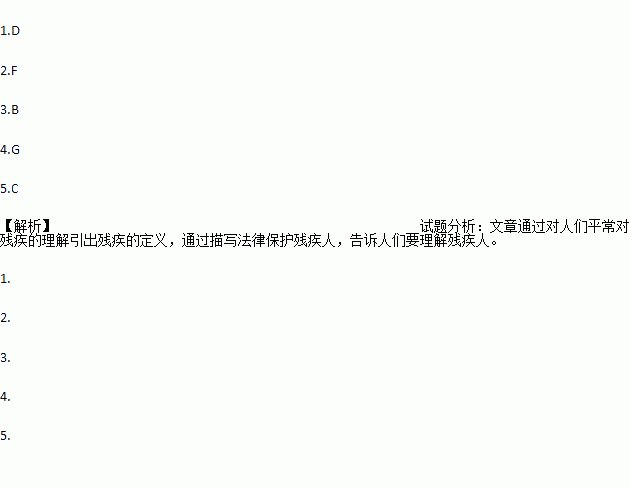题目内容
根据短文内容,从短文后的选项中选出能填入空白处的最佳选项。选项中有两项为多余选项。
Understanding Disabilities
There are around 650 million people in the world that have disabilities,yet most people are still quite ignorant about it.
(1)What do you think of when you see the word, ‘disability’?
Wheelchairs? White sticks? The Paralympics? 1. The legal definition of disability is that someone has a physical or mental impairment that has a great and long?term bad effect on his or her ability to carry out normal day?to?day activities.
This affects about 650 million of us, worldwide. 2. Most become disabled during the course of their life. So maybe the term TAB (Temporarily Able?Bodied) is better for people who are not disabled,because we may not stay that way forever.
(2)3.
Imagine not being able to see,or not being able to walk. Think of all the things that would be different. How can I get my education? What about my future? Would my friends still want to hang out with me? Will strangers laugh at me in the street? Can I get my own place? What job can I do?
Clearly,having a disability can affect many things in a person's life.
(3)Disability and the law
4. It is illegal and extremely unpleasant to discriminate (歧视) against someone who is differently abled. The label ‘disabled’ is not always helpful. Even if someone meets the legal definition,they may not see themselves that way. Instead of thinking about what is wrong with those people,or noticing what they can't do,we should look at how we like to live,and try to make it possible for everyone to join in.
After all—what is normal?5. But better understanding would be a start.
A. How can the disabled find better jobs?
B. How does disability affect people?
C. People with disabilities don't need pity.
D. Most of us have never really thought about it.
E. We should consider more for people with disabilities.
F. Only 17% of people with a disability are born with it.
G.There are laws to prevent people with disabilities being treated unfairly.

